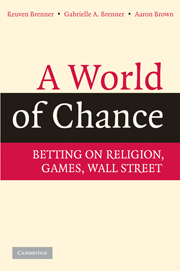Book contents
- Frontmatter
- Contents
- Preface
- Acknowledgments
- 1 From Religion to Risk Management: What to Do When Facing Uncertainty?
- 2 Anything Wrong with Gambling as a Pastime?
- 3 Are You Rich? Risk-Taking and Gambling, or the Leapfrogging Instinct
- 4 Betting on Futures and Creating Prices
- 5 Gambling as Banking: Poker, Junk Bonds, and Central Banks
- 6 Lottery Is a Taxation, and Heav'n Be Prais'd, It Is Easily Rais'd
- 7 Politics and Prohibitions; or, What's a Good Tax Anyway?
- 8 How Gamblers and Risk-Takers Correct the Future
- Appendix 1 Gambling and Risk-Taking: The Leapfrogging Instinct
- Appendix 2 Human Nature and the Civilizing Process
- Appendix 3 A Statistical Profile of Gamblers
- Notes
- Bibliography
- Name Index
- Subject Index
8 - How Gamblers and Risk-Takers Correct the Future
Published online by Cambridge University Press: 06 July 2010
- Frontmatter
- Contents
- Preface
- Acknowledgments
- 1 From Religion to Risk Management: What to Do When Facing Uncertainty?
- 2 Anything Wrong with Gambling as a Pastime?
- 3 Are You Rich? Risk-Taking and Gambling, or the Leapfrogging Instinct
- 4 Betting on Futures and Creating Prices
- 5 Gambling as Banking: Poker, Junk Bonds, and Central Banks
- 6 Lottery Is a Taxation, and Heav'n Be Prais'd, It Is Easily Rais'd
- 7 Politics and Prohibitions; or, What's a Good Tax Anyway?
- 8 How Gamblers and Risk-Takers Correct the Future
- Appendix 1 Gambling and Risk-Taking: The Leapfrogging Instinct
- Appendix 2 Human Nature and the Civilizing Process
- Appendix 3 A Statistical Profile of Gamblers
- Notes
- Bibliography
- Name Index
- Subject Index
Summary
Which shows that the story in this book is a history of humankind, told from the perspective of gamblers, risk-takers, and those who finance them. It tells the story of people who leap into the unknown, hoping to leapfrog their fellows.
Since ancient times people have tried to understand what makes some places rich and others poor. Herodotus wrote 2,500 years ago in his Histories:
For most cities which were great once are small today; and those which used to be small were great in my own time. Knowing, therefore, that human prosperity never abides long in some place, I shall pay attention to both alike.
Over the past few decades, countries like Ireland, Singapore, Taiwan, and China have leapfrogged others, which were better endowed with natural resources and whose populations had more formal education. At the same time, many oil-producing countries, for example, despite the windfall of money from selling oil, have not succeeded in leveraging their riches into prosperity.
Risk and financial markets play relatively marginal roles – if any – in most views that examine the previous question, and though gamblers and risk-takers occasionally do make their appearance, the link between what is “civilization” on one side and risk-taking, creating liquidity, and financial markets on the other is rarely made.
- Type
- Chapter
- Information
- A World of ChanceBetting on Religion, Games, Wall Street, pp. 194 - 212Publisher: Cambridge University PressPrint publication year: 2008



